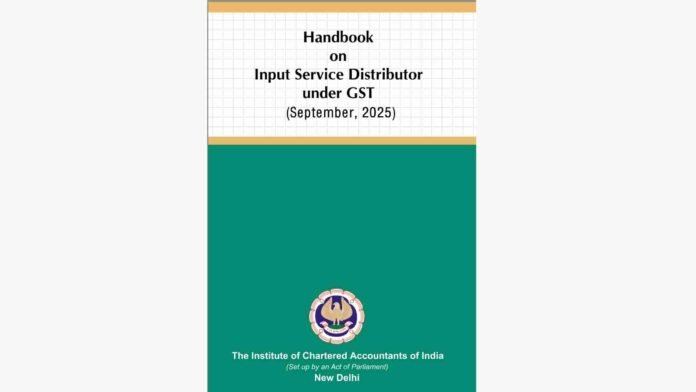The Institute of Chartered Accountants of India (ICAI), through its GST & Indirect Taxes Committee, has released the 2nd edition of the “Handbook on Input Service Distributor (ISD) under GST”, updating and expanding the 2020 edition to reflect the latest legislative amendments and practical developments up to September 26, 2025.
Comprehensive Guide to ISD under GST
The handbook serves as a comprehensive reference for professionals, businesses, and tax administrators navigating the complexities of Input Service Distribution under the Goods and Services Tax (GST) regime. It provides detailed insights into registration procedures, credit distribution mechanisms, compliance requirements, and the impact of recent amendments, including those introduced through the Finance Acts of 2024 and 2025.
Significant Legislative Updates Covered
The new edition highlights major legal changes that have transformed the ISD framework:
- Mandatory ISD Registration:
From April 1, 2025, ISD registration has become compulsory for entities distributing Input Tax Credit (ITC) of common input services. This change follows the substitution of Section 20 of the CGST Act through the Finance Act, 2024, replacing the earlier permissive “may distribute” with a mandatory “shall distribute.” - Inclusion of Reverse Charge Services:
The definition of ISD under Section 2(61) of the CGST Act has been amended to cover reverse charge supplies—both intra-State and inter-State—through Finance Acts of 2024 and 2025, aligning with Notification No. 16/2025 – CT dated September 17, 2025. - Clarification on Cross-Charge vs ISD:
The handbook references Circular No. 199/11/2023-GST issued by CBIC, which previously clarified that the ISD mechanism was not mandatory. The amendment now formalizes ISD as the sole method for credit distribution of common services, ensuring uniformity and reducing disputes.
Detailed Practical Guidance
Divided into seven chapters, the publication explains the concept, registration, credit allocation, documentation, returns, and frequently asked questions. Key features include:
- Illustrative Examples: Step-by-step calculations of ITC distribution across multiple branches based on turnover.
- Clarified Procedures: Guidance on how ISD should handle debit and credit notes, ineligible credits under Section 17(5), and redistribution in case of errors.
- Compliance Tools: Instructions for filing Form GSTR-6 and maintaining ISD records.
- Integration with Reverse Charge Mechanism (RCM): Step-by-step process for credit transfer where services are received under RCM.
Expert Acknowledgements
In the foreword, ICAI President CA Charanjot Singh Nanda commended the GST & Indirect Taxes Committee for its role in strengthening India’s indirect tax ecosystem. He described the publication as a “comprehensive and practical explanation” designed to enhance professional competence and compliance efficiency.
Committee Chairman CA Rajendra Kumar P and Vice-Chairman CA Umesh Sharma, in the Preface, emphasized that the handbook aims to simplify the ISD framework, combining statutory provisions, illustrations, FAQs, and updated interpretations. The publication reflects collaborative efforts of experts CA Dilip Phadke, CA Sunil Dandekar, and CA R. Krishna Kumar, with technical support from CA Ayushi Aggarwal.
ICAI’s Continued Role in GST Capacity Building
The release reinforces ICAI’s continuing partnership with government and industry in capacity building and policy support under GST. The Committee’s activities include training programs for tax officers, digital learning initiatives, and specialized publications for practitioners and taxpayers.
Read More: Allahabad High Court Quashes GST Registration Cancellation Order Against Real Estate Co.

